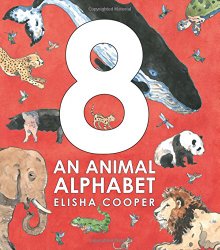
 8
8An Animal Alphabet
Review posted December 10, 2015.
Orchard Books, New York, 2015. 36 pages.
Starred Review
2015 Sonderbooks Stand-out: #5 Picture Books
Okay, this book is wonderful. For teaching about the alphabet, about counting (to eight!), about identifying multiple animals.
You get the concept of the concepts presented here right on the first page:
Find the one animal on each page that is pictured 8 times – 8 ants, 8 badgers, 8 chickens. Find all the other animals, too. Some may be familiar, such as a cat, and some not, such as a muskrat. (For help, see the “Did you know” section in the back.) But every animal is amazing and beautiful in its own way. Especially the hippopotamus. Let the exploring begin!
*Why the number 8? Because 8 is great. Because 8 is round and adorable. Because 8 is fun to count to (move over, 10). Because 8 is not too big, and not so small, but just right. Because 8 is my favorite number.
This is indeed a book for exploring. You can pretty quickly see on each page which animal is pictured 8 times, but it’s not a rubber stamp. The animal is pictured in 8 different poses, or perhaps even 8 different varieties of the animal. I grant you, the 8 ants aren’t terribly varied, but the 8 chickens include roosters as well as hens, the 8 goats include some kids, and the 8 moths and 8 newts come in many different colors.
As mentioned in the introduction, not all the animals are familiar. Some notable pages include:
Aardvark, abalone, albatross, alligator, alpaca, ant, anteater, antelope, armadillo
Camel, cat, caterpillar, chameleon, cheetah, chicken, chimpanzee, chipmunk, cicada, clam, cockroach, cow, coyote, crab
Panda, parrot, pelican, penguin, pheasant, pig, pigeon, platypus, porcupine, possum, puffin
Salmon, sandpiper, seagull, sea horse, seal, sea turtle, shark, sheep, skunk, sloth, slug, snail, squid, squirrel, starfish, swallow, swan, swordfish
The format of the book is the large and small letter in a corner of the page and the names of the animals at the bottom. The animals are all mixed up on the page, not necessarily to scale. These are paintings, not photos, but they’re lovely paintings, and you definitely get the idea. But the key in the back of the book will be needed.
So this is a good book for kids who like “Where’s Waldo” or any book of detailed pictures. I suspect it will take a few times through the book before parents know which animal matches every single name. And of course, one of the animals on each page shows up 8 times. So of course you will count them!
The key at the back has the heading “Did you know?” and each of the 184 animals in the book has a small picture and some facts about it. Here are some examples:
AARDVARK
Aardvarks are sometimes known as “ant bears.”
ARMADILLO
Armadillos spend almost eighteen hours a day napping.
BUTTERFLY
Butterflies taste with their feet.
DEER
Deer can see blue, yellow, and green, but not orange or red.
DUNG BEETLE
Dung beetles are able to tell which direction they are going from the position of the sun and the stars.
FERRET
A group of ferrets is called a “business.”
GIBBON
Gibbon couples start each day by hooting at each other.
GNAT
An evening swarm of male gnats is called a “ghost.”
LEMUR
Lemurs enjoy sunbathing.
OYSTER
A single oyster filters over forty gallons of water a day, cleaning water for other animal life.
RHINOCEROS
The skin of the rhinoceros is more than an inch thick.
VULTURE
Vultures poop and pee on their legs to keep themselves cool.
XERUS
Xeruses hold their tails over their heads to shade themselves from the sun.
YABBY
A yabby’s shell will match the color of the water it grew up in.
YAPOK
Yapoks have both webbed feet and stomach pouches.
Savvy parents probably won’t get started reading all 184 animal facts the first few times through the book. Pointing and naming and counting will keep you plenty busy.
This looks like a perfect book for my toddler-soon-to-be-preschooler nieces, or for anyone interested in exploring, naming, learning, and counting.
